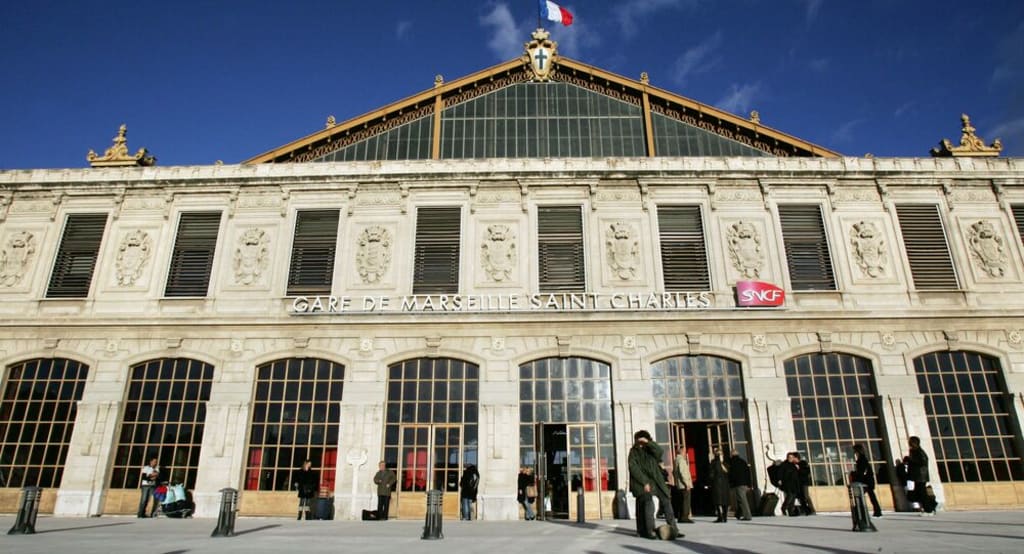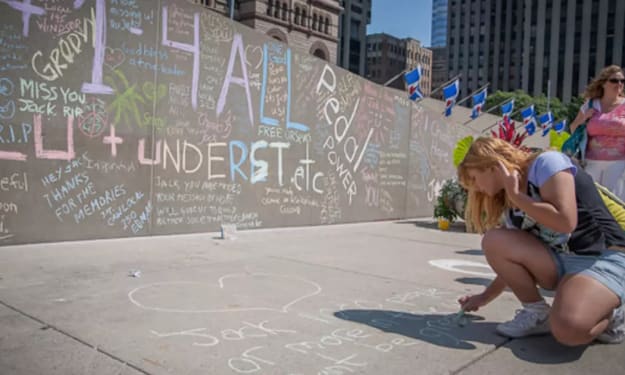
"Do you speak English?" I was standing on the platform in Marseille’s main railway station. I had just travelled northeast from Spain and was looking for the next train to Nice, on my way to the famed Riviera. At 19, I was on my own for the first time, needing a break from school after two years of CEGEP, a community college system in the province of Quebec. In Quebec, high schools go only as far as grade 11 -- I guess the powers that be don’t think 16-year-olds who’ve completed grade 11 are ready for university. At CEGEP, I excelled at extracurricular activities such as community organizing, participating in political demonstrations and, oh yes, beer drinking. I cruised through academics (except calculus, which I flunked three times).
This trip to Europe was about my need to explore. At first, I had intended to bike around France with Jacques, a guy I met at college. I'd bought a French-made bike from a tiny cycling shop in Hudson, Quebec, thinking it would be easier to get parts and have repairs done In France. Then I trained all summer. My typical Sunday training session involved riding south from my home in Hudson Heights, on through Hudson and the community of Como – about 6 kilometres to that point. Then I would pay something like $2 to take the ferry across the Lake of Two Mountains to the town of Oka. From there I’d cover another 32 kilometres, riding north through Mohawk territory, past the monastery where Oka cheese originated and on to Pointe Fortune along the Ottawa River. Next, I’d take another ferry back to the west side of the Ottawa River, heading south through farmland, passing a buffalo ranch and ending up back in Hudson Heights.
At one point I was able to do 160 kilometres in a day, but even then I had difficulty riding up hills -- to the amusement of a high school friend, Steve Allen. Steve’s ambition back in 1974 was to be a professional cyclist. Invariably on a Sunday I’d be walking my bike up the last hill of the day after a 60 plus-kilometre training ride, when Steve would ride up from behind, catch up, and chuckle loudly before calling out “Oh Adams” as he zoomed past up the hill.
Eventually my would-be travel partner Jacques realized he wasn’t able to save up the money for the trip, and while I still felt determined to go to Europe, I wasn’t comfortable cycling on my own. Enter the Student Rail Pass with unlimited travel on Western European state-owned railways. Which brings me back to standing in the Marseilles railway station looking for the connection to Nice.
"Do you speak English?" The male voice, sounding vaguely British, came from behind me. He must have noticed the big Canadian flag sewn onto my blue nylon knapsack. That flag proved to be a great way to meet people, all sorts of people.
I turned around and answered yes.
He said his name, now long forgotten, and told me he hadn't spoken to a native English speaker in five years. He asked if he could buy me a beer and have a chat in the station bar. Three thoughts went through my head, not necessarily in this order:
1. I was in no rush.
2. What could happen in a railway station bar if this guy turned out to be a WEIRDO or even worse, a murderer.
3. I came here to have adventures, and this fit.
So off I went, following him into the bar. On the way he told me he was sitting with some friends and I hoped I didn't mind. He had spent the last five years in the French Foreign Legion, he said, and had just been discharged. Everyone in his unit, including his friends in the bar, spoke other languages, and he was craving conversation with a native English speaker.
A few steps later we entered the bar. The decorations and the furniture looked like they hadn’t been updated in 30 years. High wooden stools lined a long bar where the bartenders cranked out espresso after espresso, draft beer and glasses of wine. The place was filled with people having a Friday afternoon drink or two of railway station plonk before catching their train home.
My new acquaintance looked like a soldier: trim, muscular and angular, with a brush cut. But his three friends were so lean and muscled that they made him look flabby. Every one of them was scarred, bearded and weathered. It came to me that no one wants to get on the bad side of a mercenary.
His friends sat nursing their beers, leaning back in their chairs, bodies relaxed. But their eyes said otherwise. I became aware that each of them was regularly scanning the room. Their table was in the corner and I was the only one with my back to the crowded room. No one would surprise them. Battlefield training is not suited to a leisurely beer on a Friday afternoon.
While they were all courteous and helpful to the people at adjoining tables, their reactions were spring-coiled, even when holding open a door or picking up a dropped scarf. These were soldiers who hadn't left their training behind at the Legion's headquarters in the Marseille suburb of Aubane when their five years of service ended. The group included a Serb, a Swede, and a guy from the Netherlands. Plus, my new friend, the Brit.
After my beer arrived and I toasted cheers to the lot, we sort of looked at each other. No one seemed to know what to say. I felt like I was on display as an outsider, and since only one of them spoke English as his first language, the pause stretched on uncomfortably. So, I did what any journalist would do, (I use the term journalist in a grand manner, as the only experience I had at the time was having edited the CEGEP college newspaper for one term). I asked them their stories.
How did they wind up in the French Foreign Legion? It's an odd career choice. Leave home and go fight for foreign nations – experiencing things not talked about in polite company, in far-off places where people at home, including the authorities, can't reach you.
The pause continued, then my British friend broke the ice. I think he called himself a “Teddy boy” in London, where he had knifed someone in a fight. But Teddy Boys were active in the 1950s, so either I got it wrong or he was just using the name for comparison’s sake. The knifing wasn’t intentional, he said, and I didn’t question him about why he was carrying a knife in the first place. He already had a record back then, so his gang rushed him out of the country to Marseille and the French Foreign Legion. The person he knifed lived, but there were witnesses, and jail time would have been a given even though he was still a teenager.
The other three stories were similar, though the Serb wouldn't elaborate on his. I didn’t press. I had the sense that it was a gruesome killing. Of the lot, he was also the most dangerous looking, and his intense vibe never let up. The Dutch fellow had been tied to a group dealing in drugs -- in a turf fight he knifed a rival gang member. His victim wasn’t so lucky and died in the hospital from the wounds. The Swede’s story was similar – a teenage turf war turned ugly, knives coming out, blood spilled.
I noticed I had broken into a cold sweat in my effort to choose words carefully and maintain a neutral expression -- anything to avoid sounding or looking judgmental.
As the men ordered more beers they began to loosen up. They all had new identities and French passports, their reward for five years of service. All of them felt lonely for home but didn't dare head there for fear of being recognized and facing jail time – or retribution.
There was talk of looking for work in France, using connections from home or from the brotherhood of the Legion. But mainly there was a lot of shoulder shrugging and uneasy stabs at smiling. When I thought about this later, it seemed that those open futures must have been a bit scary. Each of them had managed to walk away from a serious mistake – but how does a person figure out how to begin a new life?
The conversation began to ebb, and I saw the hour. I said it was time to catch my train. They looked happy to have had a conversation with a civilian -- it meant the next phase of their lives was already beginning. When I reached for my wallet to pay for my beers, they shouted me down.
I left the bar not entirely in control of my feet and my head, reeling with the thought that I just spent an afternoon with four men who had killed or tried to kill people. I had been so absorbed in our conversation that I had been oblivious to anything going on around me in the room. The most interesting afternoon in my 19 years.
Back at the train station platform I again scanned the departure board to confirm where to catch the train to Nice, when I heard another stranger’s voice from behind me: "Do you speak English?"
About the Creator
Jim Adams
I've always been a storyteller. Either sharing stories verbally or documenting a business plan or procedure. Using events from my past, I create stories that will transport the reader to places and events of interest around the world.
Reader insights
Outstanding
Excellent work. Looking forward to reading more!
Top insights
Compelling and original writing
Creative use of language & vocab
Easy to read and follow
Well-structured & engaging content
Excellent storytelling
Original narrative & well developed characters
Expert insights and opinions
Arguments were carefully researched and presented
Eye opening
Niche topic & fresh perspectives
Heartfelt and relatable
The story invoked strong personal emotions
Masterful proofreading
Zero grammar & spelling mistakes
On-point and relevant
Writing reflected the title & theme






Comments
There are no comments for this story
Be the first to respond and start the conversation.